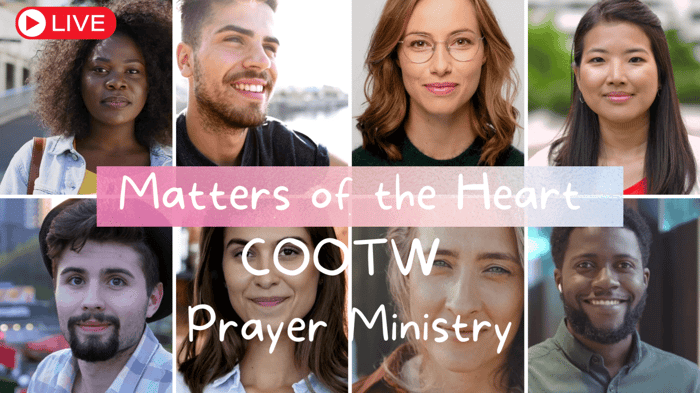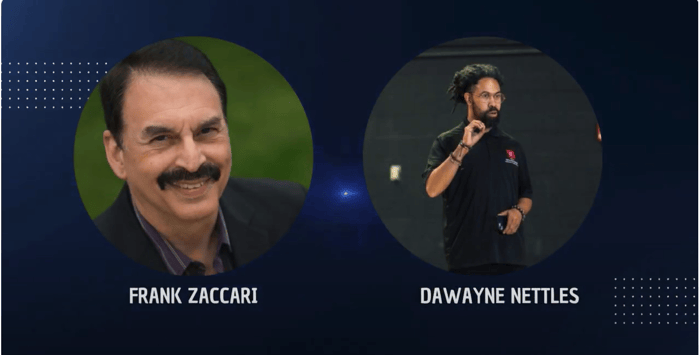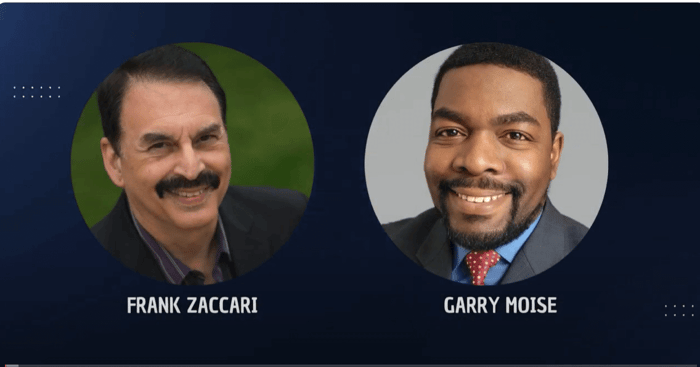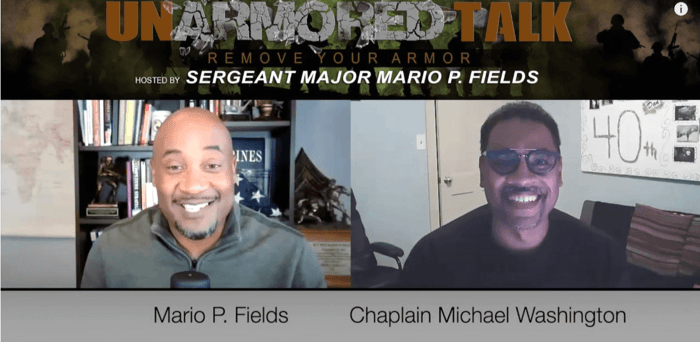In this episode, we have the privilege of hosting a distinguished guest, Michael Harris, a United States Army veteran and the International President of Mu Beta Phi Military Fraternity Incorporated. Michael's journey is a compelling narrative of resilience, dedication, and continuous growth, offering profound insights into the challenges and stressors associated with promotions, especially in high-stake environments like the military.
Meet the Guest: Michael Harris

Let's extend a warm welcome to our esteemed guest, Michael Harris. A decorated veteran, Michael's life has been a testament to integrity, courage, and significant contributions in service to our nation. Beyond his military accomplishments, he holds the prestigious position of the International President of Mu Beta Phi military fraternity incorporated.
From enlisting right out of high school to a four-year tenure in the U.S. Army, transitioning into the workforce as a correctional officer and parole agent, Michael's career path reflects remarkable resilience and determination. His commitment to duty, whether on the battlefield or within the fraternity, has molded him into a respected leader. Grounded in authenticity, consistency, and mentorship, Michael's leadership style is evident in his interactions with fraternity members and peers alike.
We eagerly anticipate delving into his experiences, gaining valuable insights that will undoubtedly inspire us all to strive for excellence in our own endeavors.
🔑Key Takeaways
- Resilience and Growth: Understand the importance of resilience, dedication, and continuous growth in overcoming life's challenges.
- Leadership Dynamics: Explore the significant role of leadership, mentorship, and decision-making in high-stake environments.
- Emotional Complexities: Recognize the emotional complexities that accompany assuming positions of power and authority.
- Personal and Professional Development: Value the ongoing journey of personal and professional development, especially in career transitions.
- Social Responsibility: Appreciate the importance of social responsibility, as demonstrated by Michael Harris's commitment to eradicating veteran homelessness.
💡Discussion Points
- Military to Civilian Transition: Unpack the process of transitioning from military service to civilian life and the associated challenges.
- Resilience and Growth in Life's Challenges: Discuss the significance of resilience, dedication, and continuous growth in overcoming obstacles.
- Leadership and Mentorship: Explore the vital roles of leadership and mentorship in personal and professional development.
- Emotional Complexities of Leadership: Examine the emotional complexities associated with assuming powerful positions, such as being the International President of a fraternity.
- Mu Beta Phi Fraternity Initiatives: Delve into the goals and initiatives of the Mu Beta Phi Military Fraternity, with a focus on their efforts towards eradicating veteran homelessness.
Listen to the Podcast
Watch Full Episode
Resources:
Website - http://www.mbphikings2017.org/
Linkedin - https://www.linkedin.com/company/mu-beta-phi-military-fraternity-inc/about/
Mario's Social Media - Find Sgt. Mario's Social media via Parade Deck
Website - Visit Still Serving Inc. Website
Transcripts by Buzzfeed
(00:00)
Welcome back to unarmored talk podcast. Thank you so much for listening and watching each episode and continue pleased to share with your friends and family members and colleagues. And don't forget to leave a rating or review if you feel this is a awesome show.
(00:17)
And you can connect to all of my social media on the parade deck just looking at show notes or you can put in the search engine Mario P. Fields parade deck and get all access to my social media. Well, let's get ready to interview another guest who is willing to remove their armor to help other people.
(00:38)
Everyone, welcome back to unarmored talk podcast. I'm still your host in 2024 as we go to rapidly approach year number four of producing amazing episodes, Mario P. Fields. And before I get to today's amazing guest, thank you guys again for sharing, subscribing and listening to each episode.
(01:00)
We're on 104 episodes and out of the 103 previous, including this one, every time you guys listen, download and share, you are generating charitable dollars that supporting steel serving incorporated.
(01:14)
And just so you guys know, last year we raised $10 ,000. I don't have the little button. And every year our goal is $10 ,000. So continue to support us, continue to watch, share, donate if you can. And let's make a difference in Pitt County, North Carolina for students in low income communities.
(01:32)
Help me break that cycle of poverty, man, the student development with those positive skills. I'm done with the admin. Let's get to our amazing guests who's willing to remove his armor to help other people.
(01:45)
Today, we have a United States Army veteran. Now you know the deal, man. You know I'm a Marine, so you got none against the army. I know it's okay. And he is the international president of Mew Beta Phi military fraternity incorporated, Michael Harris, what's going on my friend?
(02:06)
Nothing much, Mauro. Thank you for having me, man. I really appreciate it. Look forward to the opportunity, man, to sit here and have a conversation with you and your viewers, man. And see if we can get some things moving and get some interesting people in here and help you reach that goal that you're looking for.
(02:25)
Right, right. It's same for you what you guys are doing. And it seems like we've been trying to get this episode since 1788, man, but now we're here in a week and we're about to do it. So can you tell the listeners and viewers, Michael, just a little bit about yourself?
(02:41)
Absolutely. 54, Mary, four kids, two grandchildren, served in the United States Army for four years. I joined straight out of high school in 1987. Did four years, I got out in 1991. And the military provided a slingshot for me into, you know, the workforce coming back, you know, I spent the first 15 years as a correctional officer.
(03:10)
The last 15 years I spent as a parole agent all in the state of Pennsylvania. The military prepares you for a job like that, which is, you know, to me being at the parole office is how I got to me, beta five, you know, friend of mine's a he a co -worker of mine.
(03:28)
So he joined in the summer of 2018 and he came back and was telling me about it. And I was like, man, I don't have time for this fraternity stuff, man. Ain't nobody going to have me in school days doing nothing I'm supposed to be doing.
(03:41)
So that's just a small bit about me, nothing much, man. Man, with a couple of things and you guys know, I learned more about the guest on the interview than I do prior to it. Fields family is from Pennsylvania, you know, so first of all, you know, you got a special place in my heart.
(03:58)
My dad is from Pennsylvania. All my uncles, I mean, the majority of the fields family is from Pennsylvania. And then, you know, to go from the United States Army to correctional, you know, officer to now an international president of a military fraternity.
(04:14)
Tell us a little bit about the fraternity. And then I want to talk about this, this journey. What talk to us, man? Yeah, you know, new beta file military fraternity incorporated. It was a it was a vision and idea by, you know, three military veterans and active duty service members.
(04:34)
Our founder, Dr. Gary Amons, retired US Navy seller Sergeant Clifton Pyle. He's a US Army veteran. I think he's still he's about to retire, I think. And our Air Force tech sergeant Darren Coney, they all came together one day, man down in South Carolina and came what I did that there needs to be.
(04:59)
to be some kind of resource or organization that can help our veterans. And they came with the idea that, you know, maybe we can provide those resources and at the same time provide a brotherhood that could, you know, help us get to the goal of, you know, eradicating veteran homelessness.
(05:15)
And that was the main goal, you know, of Mu Beta Phi. Now it's changed over the year. I shouldn't say it's changed. It's kind of improved over the years. What it is that we want to do. We've incorporated the active eradicating veteran homelessness.
(05:31)
We started a youth mentor program. You know, our Hercules in effort has now grown even more and the overall community service to the community as a whole is where Mu Beta Phi is now. I can go on, man, for days about, you know, where we're at and what we're trying to do and and accomplishments we made.
(05:54)
But the greatest thing is, you know, Seeing that we can provide a service and need for veterans that don't know I mean you you know as yourself, you know serving that you know that the veteran hasn't always been the Center of the governmental focus, you know, we serve our time We come home and we kind of disappear into the abyss, you know, they tell us we have things out there But no one ever provides some kind of avenue for you to get there and that's that trend has went on For so many years and I say that because my father United States Marine Corps veteran Doing this Vietnam, you know time and you know discussions we would have with them He says, you know those early veteran years man, yo
u know, we didn't get that attention.
(06:42)
We didn't know we had Resources so organizations like new beta 5 That's our goal. We want to get to our veterans want to let them know. Hey, we're here to help you We're gonna point you in the right direction We may not be able to directly get you what you need But we can find you the resources and the avenues to get to where you need to get to right and you know When I went on your website, I I love the positive impact I love how I was able like you said Michael to see the growth and and just still serving I mean, you know, that's the name of a company still serving incorporated There is another company out there that's caught still serving without the ink.
(07:17)
So I that's why I always say incorporated But making that positive impact, you know doing a couple of years You have one two three four or 30 years and then coming out to the community and doing great things But now he so here you are comfortable 54 years young still look like you're 29 my friend and My you know, and you're this international not not local not look not domestic International president When you were offered this position or whatever, how did you feel were you prepared for this?
(07:54)
Not at all not at all because because it wasn't, you know, when I joined New York, it wasn't my intentions to even come, nowhere even close to this. It was my strict intention and idea that I'm gonna participate as much as possible.
(08:10)
I'm gonna provide as much insight as I possibly can. And I was gonna sit back, man, and stay in the shadows. You know, I'd rather be the guy behind the scenes than upfront. And it kinda, it moved fast.
(08:26)
You can see when I joined in our local chapter here in Philadelphia, it was only like eight of us. And we used to have a little powwow in the circle and everybody had two or three jobs to do. I actually started off as the SAA.
(08:42)
And then we got a few more people and I became the community service director. And I sat there as a community service director. And that was 2018, come around, 2020 it was now time for a new president for the local chapter and I said okay I'll do it.
(08:59)
It ain't too much long like there. And I sat there for about a year and we had a national summons in Miami and you know the, at the time the current elected vice president one had some own personal issues and he had to step down.
(09:20)
I get approached by you know the current president at the time and the founder asked it would I consider stepping in as in the interim basis. And I really was like boy this is not really where my plan is supposed to you know take me this is not my idea, but I felt a commitment to the fraternity that if I could fill the void, even on a temporary basis, did not a problem I'll do it.
(09:43)
I sat there for the last two years, and I want to say I guess my personal impact or how people view me is what catapulted me into the seat. You know, came you know, I would get a lot of questions hey you're going to run for president hey you're going to do this and I kept saying no, I like where I'm at I you know too much long light or whatever.
(10:06)
And, but I had a conversation with you know, not only my wife and some, you know, some of the other members that I'm close to. And it was like, well listen, you know you would be the perfect person to move our fraternity forward man and and, and you shouldn't pass up opportunity you can do great things.
(10:24)
And so I thought about it as a whole like what I have as a leader can the fraternity use is it going to help us get to you know that goal of eradicating veteran homes so I rolled the dice man and put my name on the ballot.
(10:38)
And you know, here I sit six, six months in I got officially seated in July at our national summit so I'm six months in and moving forward full steam ahead man. Wow, you know and. And I love how you mentioned the power of your personal brand, like your reputation and how your reputation was, you know, you didn't have to speak your reputation and your personal brand was doing the speaking.
(11:06)
It was also doing the influencing of opportunities. At any point, did you experience the emotion of fear? You know, what if, because sometimes people get promoted and it's, it could seem like a great thing, but in reality, you could also have some fears associated with it.
(11:27)
Did you have any? Oh yeah. From the, from, you know, I tell you, I didn't have no fears when I was going through the process of campaigning for it. I figured, like you said, I will let my achievements that I've done speak for themselves.
(11:42)
You know, I will let my personal demeanor and my own actions and conversations speak for itself. And once it finally set in, I'm like, man, now I'm like, Am I going to really be able to do this job? Am I going to be able to live up to the expectations?
(11:58)
So now I had a fear about the decisions I have to make. You know, I also had a fear, am I going to lose colleagues and friends in the position? Because you know, as you go through and you become a leader, people are always happy for you.
(12:16)
But then when, you know, you have to make those harsh decisions, you can lose a lot of friends as you move up, you know, the change. So I think that was like the biggest fear that I had that the people that supported me the most, if I had to turn the ties and make a tough decision that may involve them, would they still be, you know, my friends?
(12:36)
I think that was the biggest fear doing the job. Not necessarily doing the job, but the losing the confidence and the support of the people around me is probably what the biggest fear was. Yeah, Michael, that is a great point.
(12:48)
Interesting, because when I was listening to you, I even started reflecting back on my entire professional journey. And I never really heard someone put it that way. And it's true that you're getting promoted to anything.
(13:00)
It could be in a position in the private sector, in the military, you get a promotion to the next higher rank. And you're silently struggling with this fear of me and Michael were cool. Now Michael works for me.
(13:17)
Right. So how did you, and I believe this would be a great episode for a lot of folks in all industries. How did you think through that, where you're responding to this emotion and not reacting in this position?
(13:33)
You know, after a while I didn't have to take, I took a step back and thought about it. And I said to myself, and I had to be completely honest, that those people around me, if they're truly, my friends are truly supportive of me, then they'll have a complete understanding of the job that I have to do and why I have to do it.
(13:53)
to make certain decisions that may not be pleasant for everybody. But I have to think about the big picture, which is the fraternity in the organization as a whole, what's best for us all as an entire body rather than an individual.
(14:07)
So I had to sit back and think about like that. Then I also had to tell myself, so, you know, I am who I am. And I'm the same person I was before I became the international president. Right. Exact same way.
(14:19)
I could conversate the same same way. I think the same way. I provide the same amount of respect that I did when I was not the president. So I would hope that that would take and people would take that and view that.
(14:32)
And that would make it a lot easier for me to adjust to, you know, being in the position and not having that fear as much. And once I got that settled in my mind that, you know, hey, I'm still the same person and, you know, they either going to love me or hate me.
(14:48)
I know it's a harsh thing to say. but it is really the truth. They're either gonna love me or hate me. And you know, the first few months, man, in the sixth month thing, you know, you come in as a leader and you know, you provide change, you provide new direction, new structure.
(15:03)
And let me tell you, everybody's not happy and you get pushed back, but I have to stand, you know, stand on on the line and keep pushing forward because there's a greater goal at the end. And you know, it takes time for people to adjust to new leadership.
(15:19)
It's working out for the most part. So I'm good right now. You know, we, I also hear folks talk about the power of mentorship. And I love how you, you know, eloquently talked about your process of thinking through these emotions.
(15:38)
Cause again, this is on our on our talk podcast, like to focus on, to think is a choice and to react. That's natural to humans. So, so with all of that said, did you have any mentors or anyone in your network that you relied on that also helped you navigate this new position as now the international president of Mu Beta Phi?
(16:02)
No, not, not coming directly from, from you beta Phi. My experience through, through, through life is what it is. I had, I've had some great leaders that I've worked for through corrections, through parole, through the military, which that are patterning a lot of the things that I do after them, you know, I had to understand it that being a leader, I want those that believe that, you know, to be a good leader, you got to be able to educate those around you.
(16:34)
You just can't say, do this, do that, and not provide directions or instructions. And you also believe you got to lead by example, you know, in the military was always told to me that, I'm never going to tell you to do nothing that I haven't done or wouldn't do.
(16:49)
myself. And that's the way I've always been. I've come across leaders that will tell people to do this and do that and they've never ever even got close to doing what they've given directions to doing.
(17:01)
And you know, and in the field of corrections and parole, you know, those are dangerous situations you can get into. So, I'm not going to send you in somewhere that I have no experience in because we won't know how to deal with the situation.
(17:14)
So, you know, that that leadership there and then when I started going through, you know, Mubei Fonda, I got to the seat now. Our founder is probably the greatest mentor there is now. I mean, he his knowledge about the organization, not just Mubei the Faba, organizations in general and the process and the ins and outs and the way to, you know, conversating and the directions you have, you know, that's, you know, I get a lot of that from him and I think that's what gets me makes it even more comfortable to sit here.
(17:48)
But I am one of the things you mentioned about mentoring. I believe, like I said, to be a good leader, you got to mentor those below you so they can come up to your level because you're not going to always be sitting here.
(18:01)
So you got to put it's just like, you know, educating. You got to prepare the future to take over because I can't sit here forever. So I have to prepare someone to come behind me. And I think that's like one of the greatest things about being a leader.
(18:12)
When you can teach other people how to be, you know, a outstanding leader. Yeah. And Michael, you can see it in your bones virtually, man. I mean, you're, you know, you know, being authentic everybody.
(18:24)
I mean, Michael gave us some wonderful, wonderful tips and being authentic. Be you, be yourself, be authentic. I am who I am. Be consistent and definitely if it's not in your bones, if it's not a passion, then why people will know.
(18:38)
And yeah, you can see it. So I know you're having fun and I'm not going to keep you much longer or you'll invoice me. I know you will, man, and I have to send you a check. No, not at all. I listen. This right here is I love it.
(18:55)
I mean, I love being able to speak to, you know, people and that people know that, you know, that there's we're out here. So I love coming on any opportunity I can come on on your show, man, for any reason whatsoever, never hesitate, man.
(19:08)
I love it. I love being able to put our experience out there. My experience from you beta five, man. And, you know, and get it out there. Let, you know, let people know that we are here and we're help.
(19:19)
We're not a fad. We're not going nowhere. We're in our seventh year strong. I plan on us being around for about a hundred years, long stronger after that. You know, your son, my grandson, my son, me and members of you beta five somewhere down the line because they'll be looking to do that.
(19:34)
So that's the overall, you know, I'm looking at the future, you know, 50 years on the line, you know, someone else having this conversation talking about us. You know what I mean? So right here for you.
(19:45)
Yeah. And I tell you, everyone, the links will. be in the chat so you guys can get on the website. I hope and pray that you guys get on the website. Any last tips, any, if you had to think of one tip to give the listeners and viewers of what to do or what they can do, especially if they get promoted to something that they didn't really expect, what tip could you give Michael?
(20:15)
One tip, like you said, just be genuine. Be yourself. Never, don't change because of the position you in, because the person you were is how you got there. So don't let the position change. You stay genuine, stay true to yourself, stick to your beliefs, stick to your guns, and it will take you far.
(20:39)
It may not make everybody happy, but it will take you far because people will know exactly where you're coming from. They'll know exactly who the person is they dealing with. Because they'll know who you are and they'll know you are a genuine person.
(20:51)
I love it man. You guys heard it from Michael. Don't let the position change you. You change the position where you guys know the deal in a couple of weeks. If you're listening, of course, you can hear me.
(21:04)
If you're watching on youtube, you can see me. But until next time, you guys know how I sign off. God bless you. God bless your families and God bless your friends. Michael, be safe out there my friend.
(21:19)
Thank you Mario. I appreciate you man. Have a good one. You too. Thank you for listening to this most recent episode and remember you can listen and watch all of the previous episodes on my youtube channel.
(21:31)
The best way to connect to me and all of my social media is follow me on the parade deck that is www .parade deck .com or you guys soon.








